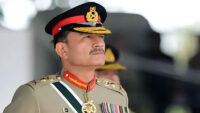With reference to the few excerpts of the article written by Lt. Gen. Tahir Mahmood (R) reproduced below, one is shocked to know that the then Pakistani government using its right, could have declined permission for hearing of the case of Kulbhushan Jhadev, lodged by India with the ICJ, as was rejected by India, when Pakistan wanted its complaint to be heard at the ICJ, on Atlantic maritime patrol aircraft of the Pakistan Naval Air Arm being shot down on 10 August 1999 (that too over Pakistani territory) by a MiG 21 fighter of the Indian Air Force killing all 16 Pakistan Navy personnel on board the Atlantic.
Now, the question is that was, for the then government, the blood of 16 Pakistani soldiers (flying within Pakistani territory) was cheaper than the incarceration of an Indian Navy officer, apprehended in Pakistan, doing espionage and terrorism.
Another question with the current PTI government is that why it has not yet questioned the former PM over the following two issues:
1. If India refused permission for hearing of Pakistani complaint on downing of Atlantic aircraft, in our own area, which took 16 lives of Pakistani soldiers, why matter was not raised at other international forums specially the UN Security Council, when we had irrefutable evidence of Indian uncalled for aggression?
2. Why (the then) Pakistani government agreed to the Indian petition about Kulbhushan Jhadev hearing at ICJ?
The replies to the above questions may help the current government to decide about for any further legal remedies, so that in future, no one dares to compromise with the vital national interests.
- Views by Lt Gen Tahir Mahmood Qazi (R) on decision of ICJ
- ICJ VERDICT
My two cents on this.
A lot of discussion is taking place on social and electronic media, both for and against.
Last night, it was a painful experience to see a few regular spoke persons of PPP and PML-N, calling it a defeat for Pakistan. What all we gained or lost is well covered by various channels and newspapers. However I want to highlight another important point.
But first, let’s see how ICJ works and it’s jurisdiction.
WORKING
The Court may entertain two types of cases: legal disputes between States submitted to it by them (contentious cases) and, requests for advisory opinions on legal questions referred to it by United Nations organs and specialized agencies (advisory proceedings).
JURISDICTION
For contentious cases, only States (States Members of the UN and other States, which have become parties to the Statute of the Court or which have accepted its jurisdiction under certain conditions) may be parties to contentious cases.
IMPORTANT THING TO NOTE HERE IS THAT BOTH PARTIES SHOULD AGREE REPEAT [BOTH PARTIES SHOULD AGREE].
And let me quote you an example from our recent history. My experience has been that the Super Powers play their cards very differently and at times interestingly. When Gen PM spoke to Gen Aziz, then CGS, from Beijing during Kargil crises, and gave him instructions to insist on calling the troops as Mujahideen, Americans recorded this conversation and passed it on to Indians, which was a total embarrassment for Mr Sartaj Aziz, who, by then as Foreign Minister was stepping on the tarmac at New Delhi.
Similarly when Indians shot down Atlantic aircraft of PN around July the same year, the conversation between Indian pilot and ATC, whereby pilot was indicating that the target is still in the waters of Pakistan, but was given the orders to shoot, irrespective. This conversation was also recorded by the ‘Powers To Be’, and handed over to Pakistan.
At that time, Pakistan wanted to take the case to the ICJ. India refused.
In the case of Kulbhushon Jhadev, the [Pakistani] Govt of the day submitted to Indian demand and hence the case was taken up by the ICJ. [We could have easily refused our permission for this hearing].
Stay tuned to Baaghi TV for more updates.






